Memories
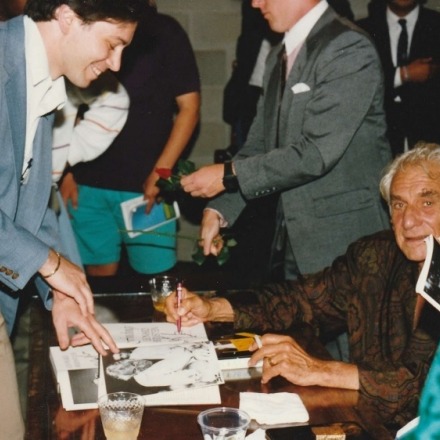
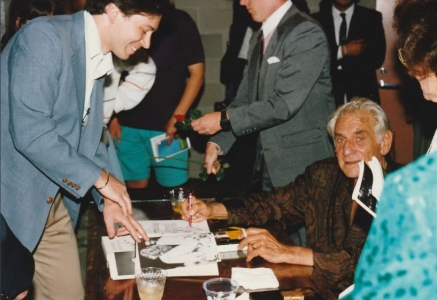
Meeting the Maestro
When the 1987 Tanglewood schedule was released, I noticed that Mr. Bernstein was conducting the August 15 concert of Mozart, Sibelius, and his Symphony No. 1. As that was a few days before our 9th anniversary, I thought having dinner at The Red Lion Inn and attending the concert would make for a nice celebration.
So I took a chance and wrote a letter to Mr. Bernstein to ask if my wife Angela and I could meet him after the concert, as I have two daughters for whom I'd like to make a gift of autographed copies of his book, The Joy of Music. To my pleasant surprise, I received a letter within about 2 weeks from Harry Kraut, saying that I should come backstage after the concert and ask for Craig Urquhart. We were thrilled!
With letter and books in hand (in addition to the two books for my daughters, I took along Mr. Bernstein's book, Findings), we headed for dinner and the concert. Following the concert - we usually sit on the lawn but sat inside the Shed - we went to the backstage area behind the Shed, where a long line of people were waiting to get backstage.
Rather than join the line, we went to the head of the line and presented the letter to someone - it may have been Harry Kraut, though I don't know for sure - and we were then taken to the room backstage where it almost seemed like a party was going on. Whoever escorted us in took me over to Mr. Bernstein, who was sitting at a table in a red robe, cigarette in hand, and introduced me as "The nice young man who wrote you the letter" or something along those lines.
I introduced myself to Mr. Bernstein, said how much we enjoyed the concert and expressed my appreciation for him taking the time to meet us. My wife Angela hung back to take some pictures, one of which is attached. Mr. Bernstein asked for my daughters' names and signed a copy of The Joy of Music for each of them, and then he asked for wife's name and signed Findings for her. After again thanking him for taking the time and the pleasure of meeting him, we made our exit. It was only a brief meeting, but it capped off a wonderful evening!
So I took a chance and wrote a letter to Mr. Bernstein to ask if my wife Angela and I could meet him after the concert, as I have two daughters for whom I'd like to make a gift of autographed copies of his book, The Joy of Music. To my pleasant surprise, I received a letter within about 2 weeks from Harry Kraut, saying that I should come backstage after the concert and ask for Craig Urquhart. We were thrilled!
With letter and books in hand (in addition to the two books for my daughters, I took along Mr. Bernstein's book, Findings), we headed for dinner and the concert. Following the concert - we usually sit on the lawn but sat inside the Shed - we went to the backstage area behind the Shed, where a long line of people were waiting to get backstage.
Rather than join the line, we went to the head of the line and presented the letter to someone - it may have been Harry Kraut, though I don't know for sure - and we were then taken to the room backstage where it almost seemed like a party was going on. Whoever escorted us in took me over to Mr. Bernstein, who was sitting at a table in a red robe, cigarette in hand, and introduced me as "The nice young man who wrote you the letter" or something along those lines.
I introduced myself to Mr. Bernstein, said how much we enjoyed the concert and expressed my appreciation for him taking the time to meet us. My wife Angela hung back to take some pictures, one of which is attached. Mr. Bernstein asked for my daughters' names and signed a copy of The Joy of Music for each of them, and then he asked for wife's name and signed Findings for her. After again thanking him for taking the time and the pleasure of meeting him, we made our exit. It was only a brief meeting, but it capped off a wonderful evening!
Frankin Laufer
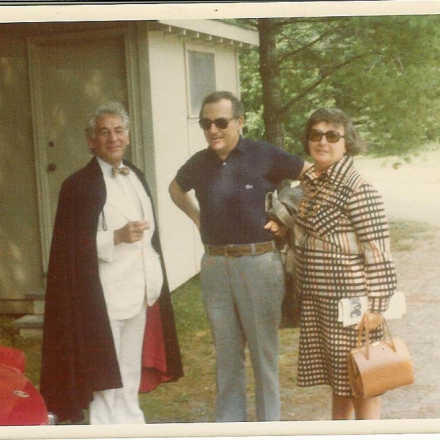
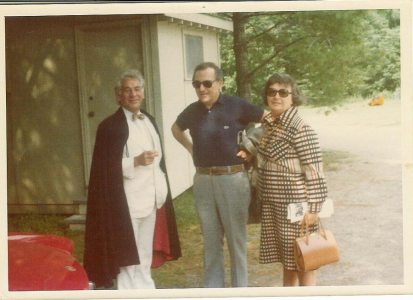
Leonard Bernstein with my parents at Tanglewood 1974
My parents, Leonard and Marion Burkat, were long time friends from Boston Latin School days and onward until the end of life. I know this picture was taken at Tanglewood in the summer of 1974, perhaps by Harry Kraut, another parental friend and colleague from my father's days at the BSO and then in NYC.
Caroline Burkat Hall, Danbury, CT, United States
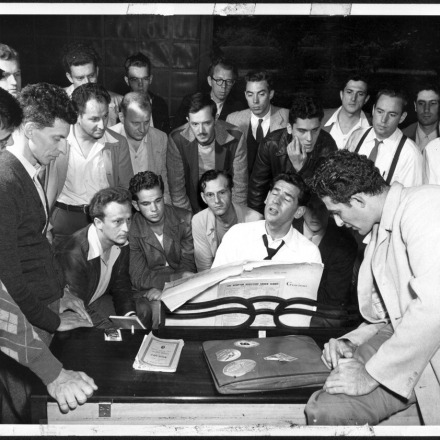
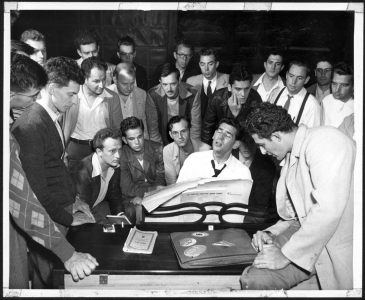
My first view (in the flesh!) of Leonard Bernstein
Of all the people I've ever met, Leonard Bernstein has been my most significant memory (and I've even met the Dalai Lama.) The first time I saw him, for real, I was sitting in the parlor in Seranak, awaiting his arrival to give a conducting masterclass at Tanglewood.
I couldn't believe my luck to have been allowed to observe the class -- I was just a high school composition student, but since I (and two others) from the program had also done some conducting, we were allowed to sit in. I sat toward the back, looking toward the front of the house, and suddenly I saw a flash of red - that was Bernstein, dressed in a bright red turtleneck (in summer!), speeding past the front window on his way to the house! In the room, a recording of Mozart's Jupiter Symphony, last movement, was playing on a record player.
Mr. Bernstein greeted everyone in the room and then his attention turned to the music. He raised his hand slightly, flattened and parallel to the floor, and said that Mozart exists somewhere between Earth and Heaven.
[Photo: Bernstein with his class of conducting auditors at Tanglewood, summer 1948. Courtesy of the Library of Congress Music Division.]
I couldn't believe my luck to have been allowed to observe the class -- I was just a high school composition student, but since I (and two others) from the program had also done some conducting, we were allowed to sit in. I sat toward the back, looking toward the front of the house, and suddenly I saw a flash of red - that was Bernstein, dressed in a bright red turtleneck (in summer!), speeding past the front window on his way to the house! In the room, a recording of Mozart's Jupiter Symphony, last movement, was playing on a record player.
Mr. Bernstein greeted everyone in the room and then his attention turned to the music. He raised his hand slightly, flattened and parallel to the floor, and said that Mozart exists somewhere between Earth and Heaven.
[Photo: Bernstein with his class of conducting auditors at Tanglewood, summer 1948. Courtesy of the Library of Congress Music Division.]
Lauren Bernofsky, Bloomington, IN, United States
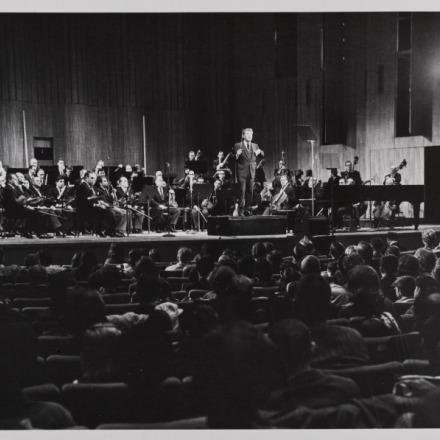
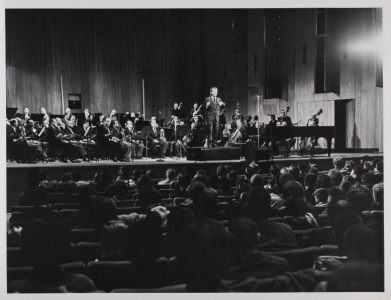
When Leonard Bernstein took over my tiny 30-piece high school band
It was 1964 and in my first full-time teaching job as a band teacher in a small rural Oklahoma school district, I assigned watching the New York Philharmonic Young People’s Concerts. My tiny band had only 30 members, and one of my college mentors who had come to give a clinic would always refer to them as “your little silver cornet band.” Looking at the piles of parent excuses on my desk the day after the first Young People’s concert, I saw it was not a popular assignment. Only three students watched the program. Yet, those three came into class with an evangelistic enthusiasm which was promptly met with skepticism by the rest of the students.
The next concert, four additional students watched, and those returned to school with an excitement that matched the others, and a curiosity began to spill over to the rest of the band. By the fourth concert, fully half of the band watched the concerts. The excuses still trickled in, however. But in those excuses, I began to see a theme, dads, who couldn’t or wouldn’t relinquish their TVs to watch the nation’s number one program, “Wagon Train.”
The last concert was coming—about Charles Ives, I believe. By this time all of the students were openly curious about this Leonard Bernstein fever they had seen take over their classmates. One day during class, the students asked to discuss how they could watch the last concert, and work around “Wagon Train.” They hatched a plan which was to pick a home where they could all go to watch the program, and those parents could either stay and be chaperones or go to someone’s home for “Wagon Train.” They worked it out, and that is what they did!
More that fifty years later, I still reflect on the fire that Leonard Bernstein ignited in that tiny band room. I just made an assignment, and Bernstein’s inspiration did the rest.
[Photo: Young People's Concert at Philharmonic Hall (Avery Fisher Hall), NY, circa 1964. Courtesy of the New York Philharmonic Leon Levy Digital Archives.]
The next concert, four additional students watched, and those returned to school with an excitement that matched the others, and a curiosity began to spill over to the rest of the band. By the fourth concert, fully half of the band watched the concerts. The excuses still trickled in, however. But in those excuses, I began to see a theme, dads, who couldn’t or wouldn’t relinquish their TVs to watch the nation’s number one program, “Wagon Train.”
The last concert was coming—about Charles Ives, I believe. By this time all of the students were openly curious about this Leonard Bernstein fever they had seen take over their classmates. One day during class, the students asked to discuss how they could watch the last concert, and work around “Wagon Train.” They hatched a plan which was to pick a home where they could all go to watch the program, and those parents could either stay and be chaperones or go to someone’s home for “Wagon Train.” They worked it out, and that is what they did!
More that fifty years later, I still reflect on the fire that Leonard Bernstein ignited in that tiny band room. I just made an assignment, and Bernstein’s inspiration did the rest.
[Photo: Young People's Concert at Philharmonic Hall (Avery Fisher Hall), NY, circa 1964. Courtesy of the New York Philharmonic Leon Levy Digital Archives.]
Myra Starr, Okmulgee, OK, United States
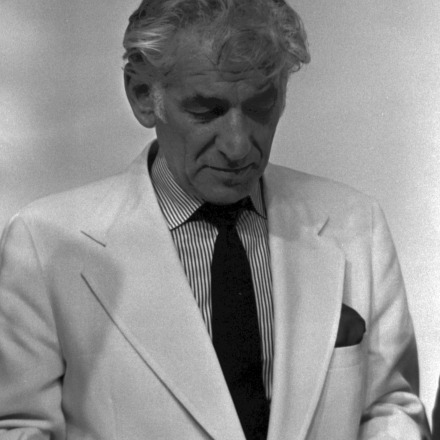
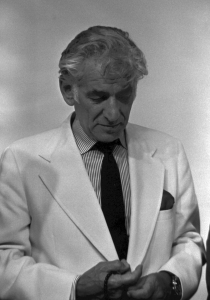
Birthday Celebration Memories of LB
Here's a excerpt from an email I sent my friends today, with memories of my interactions with Lenny back in the 1970s, around the time he was working on the Norton Lectures:
I was and am truly lucky: not only was my life, as a child, deeply influenced by watching the broadcasts of the Young People's Concerts, from which I learned the love of all kinds of music, from Beethoven to the Beatles, from jazz to roots music — but years later, I was also fortunate to:
-Photograph him many times in both the concert hall and the recording studio;
-Engage with him in conversation about music and about politics (including Nixon!);
-Share a piano bench with him for a performance of "Trouble in Tahiti" at the (old) Whitney Museum in New York;
-Sit in the orchestra at the great Manhattan Center as he conducted one of the first-ever “quadraphonic” recordings for Columbia Records (with the orchestra completely surrounding him . . . remember quadraphonic recordings?);
-Be in the control room with him and producer John McClure to discuss playbacks during numerous recording sessions in New York over the course of two years (this was before Lenny left the Columbia label and resolved only to record complete, unedited performances);
-To my great joy and good fortune, get some informal conducting lessons from him (my first-edition score to his MASS is still filled with his conducting notations for me — and no, it’s not for sale);
-Argue good-naturedly with him about whether the narrator of his Third Symphony should be a man or a woman (although his wife Felicia narrated the first recording of the symphony, he later advocated for a male narrator, while I disagreed passionately — the nerve I had! But he listened to my arguments...);
and . . . and . . . and . . .
-On multiple occasions, he called me a friend.
Because of him, I have great personal memories: He introduced me to playwright Thornton Wilder in Danbury, CT, and to composers Aaron Copland and Lukas Foss at Tanglewood. One morning, when I dragged my tired ass into a New York recording session, and he saw the condition I was in, he wordlessly handed me his ever-present bottle of Ballantine’s Scotch. I didn’t drink Scotch, and I still don’t, but that morning, I did. He thought I should go to Curtis (where he went) and pursue music (I didn’t, probably because I was, and to a large extent continue to be, a fool). God knows if I can still even read music. That feels like a lifetime ago.
My photos of the concerts and recording sessions are now part of the Bernstein Papers at the Library of Congress: I had given them over to his office, with the proviso that license fees for publication be donated to the Tanglewood Music Festival Student Orchestra fellowships.
The photo included here is a candid portrait taken in 1975 (and unfortunately not well-scanned). He's holding worry beads given to him by Maria Callas. At the time, he and Alan Jay Lerner were having a "giving up smoking" competition, and Lenny was using the beads as a help to keep him from smoking. Of course, as we all know, it didn't work for long...
I was and am truly lucky: not only was my life, as a child, deeply influenced by watching the broadcasts of the Young People's Concerts, from which I learned the love of all kinds of music, from Beethoven to the Beatles, from jazz to roots music — but years later, I was also fortunate to:
-Photograph him many times in both the concert hall and the recording studio;
-Engage with him in conversation about music and about politics (including Nixon!);
-Share a piano bench with him for a performance of "Trouble in Tahiti" at the (old) Whitney Museum in New York;
-Sit in the orchestra at the great Manhattan Center as he conducted one of the first-ever “quadraphonic” recordings for Columbia Records (with the orchestra completely surrounding him . . . remember quadraphonic recordings?);
-Be in the control room with him and producer John McClure to discuss playbacks during numerous recording sessions in New York over the course of two years (this was before Lenny left the Columbia label and resolved only to record complete, unedited performances);
-To my great joy and good fortune, get some informal conducting lessons from him (my first-edition score to his MASS is still filled with his conducting notations for me — and no, it’s not for sale);
-Argue good-naturedly with him about whether the narrator of his Third Symphony should be a man or a woman (although his wife Felicia narrated the first recording of the symphony, he later advocated for a male narrator, while I disagreed passionately — the nerve I had! But he listened to my arguments...);
and . . . and . . . and . . .
-On multiple occasions, he called me a friend.
Because of him, I have great personal memories: He introduced me to playwright Thornton Wilder in Danbury, CT, and to composers Aaron Copland and Lukas Foss at Tanglewood. One morning, when I dragged my tired ass into a New York recording session, and he saw the condition I was in, he wordlessly handed me his ever-present bottle of Ballantine’s Scotch. I didn’t drink Scotch, and I still don’t, but that morning, I did. He thought I should go to Curtis (where he went) and pursue music (I didn’t, probably because I was, and to a large extent continue to be, a fool). God knows if I can still even read music. That feels like a lifetime ago.
My photos of the concerts and recording sessions are now part of the Bernstein Papers at the Library of Congress: I had given them over to his office, with the proviso that license fees for publication be donated to the Tanglewood Music Festival Student Orchestra fellowships.
The photo included here is a candid portrait taken in 1975 (and unfortunately not well-scanned). He's holding worry beads given to him by Maria Callas. At the time, he and Alan Jay Lerner were having a "giving up smoking" competition, and Lenny was using the beads as a help to keep him from smoking. Of course, as we all know, it didn't work for long...
Kenn Rabin, San Anselmo, CA, United States
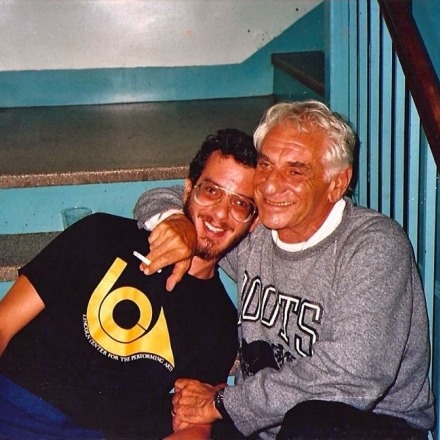
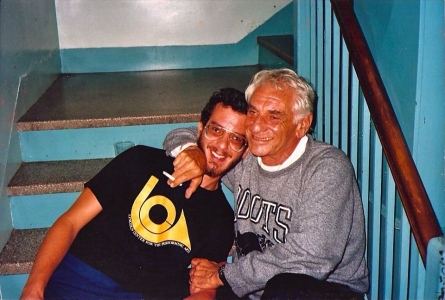
Lenny and me, Tanglewood, 1986
I had the wonderful opportunity to work with Leonard Bernstein on three occasions - Brahms 4 at the LAPhil Institute, and Copland 3 and Sibelius 2 at Tanglewood. The concerts were like rock concerts, and the rehearsals illuminating and riveting. His passion for and understanding of every nuance and emotional peak of the music was beyond inspiring. And he was very kind to and supportive of me.
Thanks for everything, Lenny!
Thanks for everything, Lenny!
Tod Bowermaster , Fenton, MO, United States
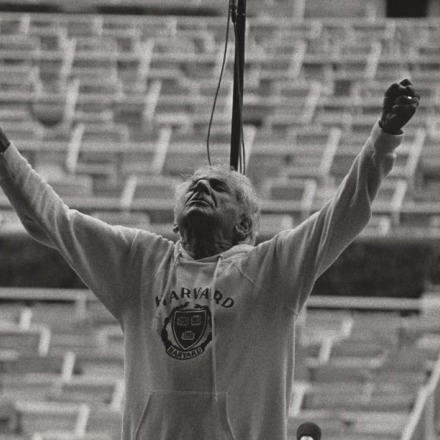
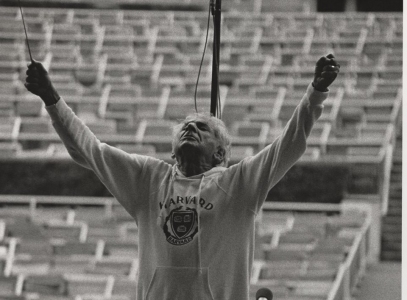
First Introduction
My parents gave me a love for classical music as a young child. I must have only been 10 years old when they took me to the Hollywood Bowl, orchestra conducted by Leonard Bernstein. He became a household name after that. Amazing!
Photo: Bernstein rehearsing at the Bowl in 1983. Photo by Robert Millard.
Photo: Bernstein rehearsing at the Bowl in 1983. Photo by Robert Millard.
Bernie Malik, Riverside, CA, United States
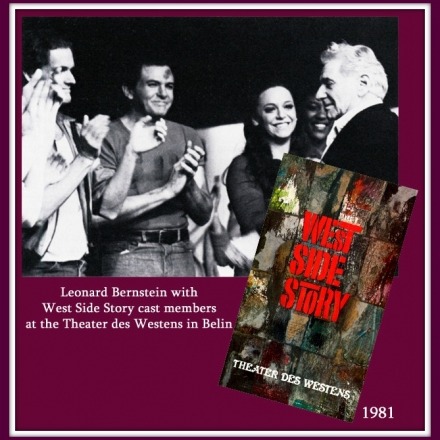
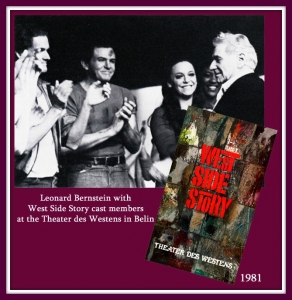
Bernstein at the Theater des Westens in Berlin
Today, August 25th, 2018, we´re celebrating the 100th anniversary of Leonard Bernstein´s birthday. In this photo, Mr. Bernstein is greeting Steve Barton and the cast members of the German production of “West Side Story” at the Theater des Westens in Berlin (1981).
Maria Candil, Madrid, Spain & Austin, TX, United States
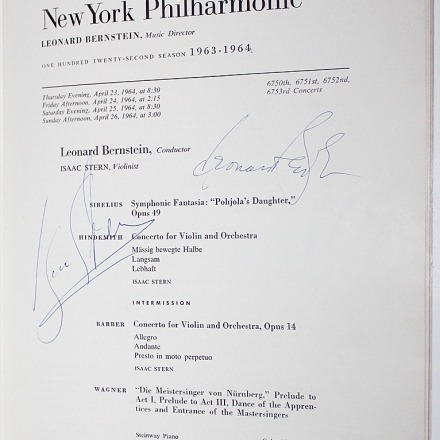
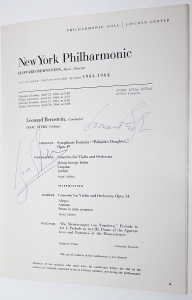
Never too late to say Thank You?
I met Leonard Bernstein twice, if getting an autograph can be counted as meeting. As I reflect upon his life, and the enormous impact he made on mine, I think back to those two signings and it bothers me that I might not have said the simple words “thank you” to him. It would be an infinitesimally trivial omission in his life, but he enjoyed being appreciated. Two more thank you's wouldn’t have hurt, and I would have the comfort of knowing that at least I expressed a tiny token of appreciation.
I was 13 the first time I “met” Mr. Bernstein. (I had been to a Young People’s Concert a couple of years earlier and had the thrill of seeing him sweep from the Carnegie Hall stage door to his waiting limo.) It was 1964 and my family traveled to New York City from upstate so that my mother and I could attend a New York Philharmonic concert in the new Philharmonic Hall. Bernstein conducted, Isaac Stern was soloist for two violin concertos. I was excited just to be in New York, for it was where HE lived. For me, the air in the city literally vibrated because I knew that somewhere in this town, Leonard Bernstein lived and breathed.
The concert was marvelous and I was in heaven. As the final applause died down, my mother suggested we visit the Green Room. I readily agreed, though I had no idea what a Green Room was, for she said Bernstein might be there. She easily found the Green Room, which turned out to be a rather ordinary looking “lounge.” It was moderately busy but by no means a madhouse. It seemed to me that everyone knew each other and I couldn’t understand why outsiders such as my mother and I were allowed to remain. Standing towards the center of the room, momentarily alone, was Isaac Stern. My mother approached him and asked if he would sign our programs.
As Mr. Stern was signing, I spotted “LB”, and my first thought was “Oh, he’s little” (shame on me – he was not tall, and he became smaller as he aged; but he was never little for his presence was large). He had almost a furtive demeanor as he kind of “glided” about one side of the room. I returned my attention to Mr. Stern. (I’m quite sure I thanked him!)
A short while later Mr. Bernstein settled into the spot where he was comfortable receiving his fans and signed autographs. I don’t recall it being a very long line, but as I waited I was excited, nervous, and at a loss – afraid to look at my hero. I’m not sure if my fear was caused by not wanting to rudely stare, or because I was intimidated seeing the man in person. I decided it was safest to look at his hands; after all they were very nice hands – not at all scary. So I watched his hands through the wait and kept my eyes on his hands as I passed my program to him and received it back (what a dope I was) – and in this petrified shrinking-violet state, did I say thank you? I don’t know.
Six years later I was in college and New York City was now my home. I and a couple of friends attended a Bernstein concert and I suggested we visit the Green Room. Over the course of the intervening years I’d had several girlhood crushes but Leonard Bernstein was no longer a crush – he was a fact in my life as foundational as anyone or anything. I wasn’t as intimidated as before. I remember there was an older gentleman in front of me who was talking to the Maestro as I waited for Bernstein to sign my program. The man was haranguing LB about his nephew, “a most remarkably gifted musician, a violinist, the next Heifetz, etc, etc”; insisting that Bernstein hear him some time. After the gentleman departed and I presented my program to Mr. Bernstein, I wondered if he might be thankful that I asked for nothing more than an autograph. I hope I had the maturity and poise to say “thank you.”
A few minutes later I heard a voice behind me, the same old gentleman again pleading with Bernstein, “When will you hear my nephew?” LB finally replied, “Oh, I’ll hear him.” The man exclaimed in glee “Ohhh Maestro! How wonderful! When will you hear him?” (He fell right into LB’s trap.) “When he’s been heard of.” LB answered. Loud groan of disappointment. I turned to look at them. Bernstein’s retort ended the subject. I thought the reply “was kind of mean.” (An opinion I later revised when I learned that Bernstein was constantly barraged with requests for favors.)
To Mr. Bernstein I now say “Thank you”; for signing the programs, and for much more. Thank you for giving so generously of yourself. For sharing your remarkable talents. For your enduring dedication to music. For bringing the joy of music into millions of lives. For your courage and for your humanity. You were not a perfect being, but you were a very human being. You devoted yourself to your passions, almost literally to your last breath.
I believe that your spirit is still with this world; that you are still giving. So I write my appreciation now as if you were here to absorb it.
I’ve read that you wished that you were loved by everybody in the world. Well, for that Cosmic Count, put me down as one in the love column. And while you are at it, put my mother there too. Her impetus to visit the Green Room that night must have been love too.
Happy 100th Birthday Maestro!! You needn’t have worried you would not be remembered.
I was 13 the first time I “met” Mr. Bernstein. (I had been to a Young People’s Concert a couple of years earlier and had the thrill of seeing him sweep from the Carnegie Hall stage door to his waiting limo.) It was 1964 and my family traveled to New York City from upstate so that my mother and I could attend a New York Philharmonic concert in the new Philharmonic Hall. Bernstein conducted, Isaac Stern was soloist for two violin concertos. I was excited just to be in New York, for it was where HE lived. For me, the air in the city literally vibrated because I knew that somewhere in this town, Leonard Bernstein lived and breathed.
The concert was marvelous and I was in heaven. As the final applause died down, my mother suggested we visit the Green Room. I readily agreed, though I had no idea what a Green Room was, for she said Bernstein might be there. She easily found the Green Room, which turned out to be a rather ordinary looking “lounge.” It was moderately busy but by no means a madhouse. It seemed to me that everyone knew each other and I couldn’t understand why outsiders such as my mother and I were allowed to remain. Standing towards the center of the room, momentarily alone, was Isaac Stern. My mother approached him and asked if he would sign our programs.
As Mr. Stern was signing, I spotted “LB”, and my first thought was “Oh, he’s little” (shame on me – he was not tall, and he became smaller as he aged; but he was never little for his presence was large). He had almost a furtive demeanor as he kind of “glided” about one side of the room. I returned my attention to Mr. Stern. (I’m quite sure I thanked him!)
A short while later Mr. Bernstein settled into the spot where he was comfortable receiving his fans and signed autographs. I don’t recall it being a very long line, but as I waited I was excited, nervous, and at a loss – afraid to look at my hero. I’m not sure if my fear was caused by not wanting to rudely stare, or because I was intimidated seeing the man in person. I decided it was safest to look at his hands; after all they were very nice hands – not at all scary. So I watched his hands through the wait and kept my eyes on his hands as I passed my program to him and received it back (what a dope I was) – and in this petrified shrinking-violet state, did I say thank you? I don’t know.
Six years later I was in college and New York City was now my home. I and a couple of friends attended a Bernstein concert and I suggested we visit the Green Room. Over the course of the intervening years I’d had several girlhood crushes but Leonard Bernstein was no longer a crush – he was a fact in my life as foundational as anyone or anything. I wasn’t as intimidated as before. I remember there was an older gentleman in front of me who was talking to the Maestro as I waited for Bernstein to sign my program. The man was haranguing LB about his nephew, “a most remarkably gifted musician, a violinist, the next Heifetz, etc, etc”; insisting that Bernstein hear him some time. After the gentleman departed and I presented my program to Mr. Bernstein, I wondered if he might be thankful that I asked for nothing more than an autograph. I hope I had the maturity and poise to say “thank you.”
A few minutes later I heard a voice behind me, the same old gentleman again pleading with Bernstein, “When will you hear my nephew?” LB finally replied, “Oh, I’ll hear him.” The man exclaimed in glee “Ohhh Maestro! How wonderful! When will you hear him?” (He fell right into LB’s trap.) “When he’s been heard of.” LB answered. Loud groan of disappointment. I turned to look at them. Bernstein’s retort ended the subject. I thought the reply “was kind of mean.” (An opinion I later revised when I learned that Bernstein was constantly barraged with requests for favors.)
To Mr. Bernstein I now say “Thank you”; for signing the programs, and for much more. Thank you for giving so generously of yourself. For sharing your remarkable talents. For your enduring dedication to music. For bringing the joy of music into millions of lives. For your courage and for your humanity. You were not a perfect being, but you were a very human being. You devoted yourself to your passions, almost literally to your last breath.
I believe that your spirit is still with this world; that you are still giving. So I write my appreciation now as if you were here to absorb it.
I’ve read that you wished that you were loved by everybody in the world. Well, for that Cosmic Count, put me down as one in the love column. And while you are at it, put my mother there too. Her impetus to visit the Green Room that night must have been love too.
Happy 100th Birthday Maestro!! You needn’t have worried you would not be remembered.
Anne Musso, Valatie, NY, United States
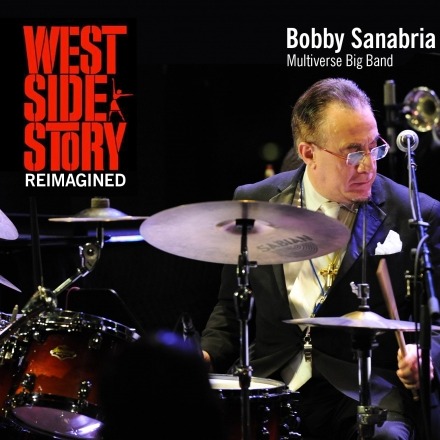
West Side Story and Maestro B
West Side Story holds a special place in my heart. I first saw the movie as a young boy when my parents José and Juanita took me and my sister Joanne to the luxurious Loews Paradise on the Grand Concourse in my hometown Da’ Bronx in celebration of the film’s 10th anniversary. At that time there wasn’t anything that acknowledged the contributions we had made, let alone the existence of NYC’s Puerto Rican community, other than articles about gangs and crime in relation to us. But somehow as a child I knew better.
Despite the racism my parents had experienced, and subsequently my sister and I were also were subjected to, we somehow knew that our existence, our historical presence in the city had literally transformed it culturally, stylistically, and of course musically. The authors knew this as well. Yes, gang life in NYC back in the 50s forms the framework of West Side Story (how could it not, it was an undeniable reality) and of course it’s based on Shakespeare’s Romeo and Juliet. But that’s looking at things superficially.
It’s a complex story of romance set in the energy of the inner city amidst racism, bigotry, territorial imperative, and what causes it - fear and ignorance, that’s offset by cultural pride, humor, and the spirit of fighting for what one believes in - be it good or bad. In the lovers, Tony and Maria’s case, it’s about their hopes, dreams, and the ultimate power - love.
Setting aside the ridiculous move by the producers to actually spray paint the actors playing the Puerto Rican characters in the film orange - something me and my sister noticed right away, and confirmed by star Rita Moreno in her memoirs - when I first heard the music I was flabbergasted. The power, majesty, mystery, the kinetic energy - it was NYC, my city, up and down!
Maestro Bernstein had tapped directly into what sets our fair city apart from any other place on spaceship Earth - aché (energy), hipness, and cool. I will never forget that moment for it changed my life influencing me as a musician in ways that I will be forever grateful. I hope you're enjoying WSS Reimagined along with our mutual friend in heaven, Maestro Tito Puente. And in keeping with your humanitarian spirit, the majority of the proceeds go to Puerto Rico to aid the musicians there who have been suffering the after effects of the recent hurricanes. Happy 100th birthday Maestro, as Duke would say, "We love you madly!"
Despite the racism my parents had experienced, and subsequently my sister and I were also were subjected to, we somehow knew that our existence, our historical presence in the city had literally transformed it culturally, stylistically, and of course musically. The authors knew this as well. Yes, gang life in NYC back in the 50s forms the framework of West Side Story (how could it not, it was an undeniable reality) and of course it’s based on Shakespeare’s Romeo and Juliet. But that’s looking at things superficially.
It’s a complex story of romance set in the energy of the inner city amidst racism, bigotry, territorial imperative, and what causes it - fear and ignorance, that’s offset by cultural pride, humor, and the spirit of fighting for what one believes in - be it good or bad. In the lovers, Tony and Maria’s case, it’s about their hopes, dreams, and the ultimate power - love.
Setting aside the ridiculous move by the producers to actually spray paint the actors playing the Puerto Rican characters in the film orange - something me and my sister noticed right away, and confirmed by star Rita Moreno in her memoirs - when I first heard the music I was flabbergasted. The power, majesty, mystery, the kinetic energy - it was NYC, my city, up and down!
Maestro Bernstein had tapped directly into what sets our fair city apart from any other place on spaceship Earth - aché (energy), hipness, and cool. I will never forget that moment for it changed my life influencing me as a musician in ways that I will be forever grateful. I hope you're enjoying WSS Reimagined along with our mutual friend in heaven, Maestro Tito Puente. And in keeping with your humanitarian spirit, the majority of the proceeds go to Puerto Rico to aid the musicians there who have been suffering the after effects of the recent hurricanes. Happy 100th birthday Maestro, as Duke would say, "We love you madly!"
Bobby Sanabria, Bronx, NY, United States
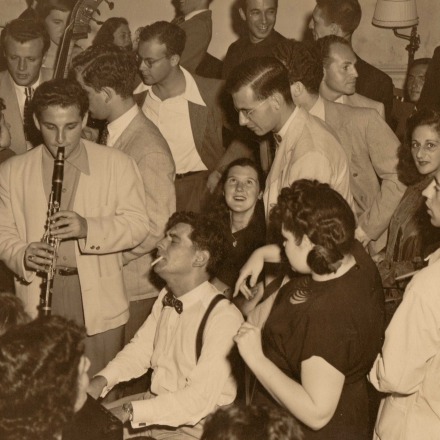
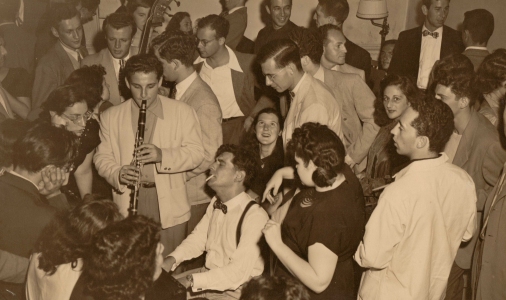
Dick Waller, Principal Clarinet CSO, talks about meeting and playing with LB
Dick Waller, principal clarinet with the CIncinnati Symphony for many years, talks about meeting and playing with Leonard Bernstein—both before he was famous and after.
Margy Waller, Cincinnati, OH, United States
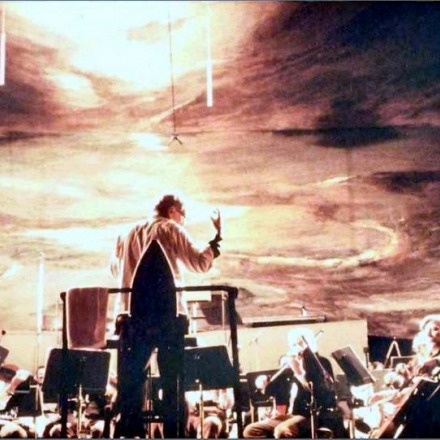
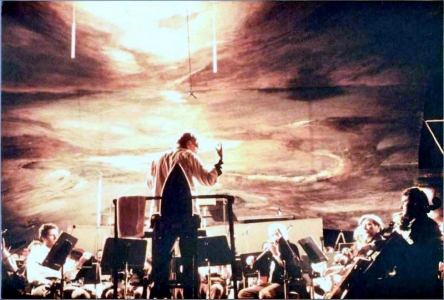
Tristan und Isolde
Leonard Bernstein rehearsing "Tristan und Isolde" 1981 München, Herkulessaal.
Unforgettable!
Unforgettable!
Sabine Schimmel, Germany
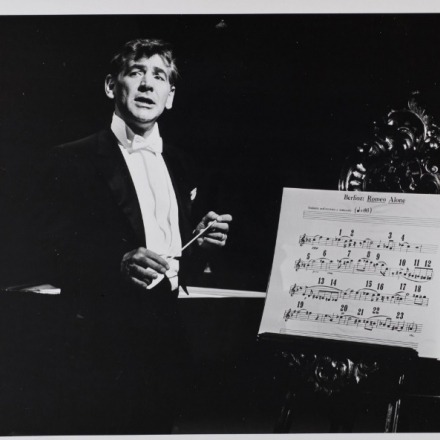
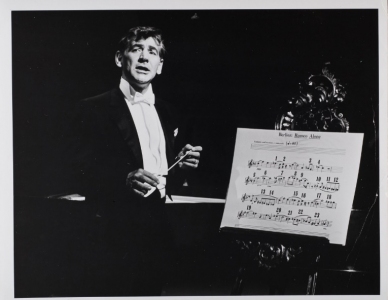
Always by my side
My parents used to spend Sunday mornings watching Young People Concerts on TV, in a country where very little happened coming from outside - Portugal in the sixties - you can fill the blanks...and so our acquaintance was made, until now.
He IS my Uncle Lenny, always bewildering me, and yet so close, in my days of insane work or in relaxing time. I have no pictures or anything like that, only the love I have for someone I never knew personally but who gave it back to me in double by his art and simply being as he was. Love you, Mr Bernstein, uncle Lenny...
Photo courtesy of the New York Philharmonic Leon Levy Digital Archives
He IS my Uncle Lenny, always bewildering me, and yet so close, in my days of insane work or in relaxing time. I have no pictures or anything like that, only the love I have for someone I never knew personally but who gave it back to me in double by his art and simply being as he was. Love you, Mr Bernstein, uncle Lenny...
Photo courtesy of the New York Philharmonic Leon Levy Digital Archives
Maria Costa, Porto, Portugal
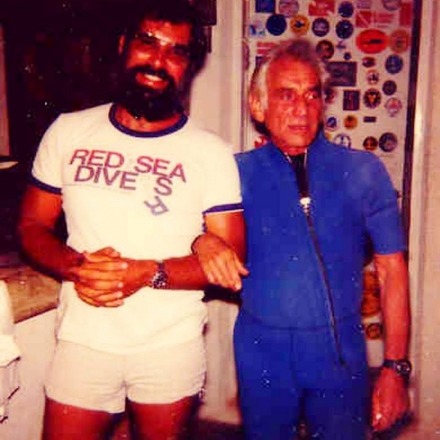
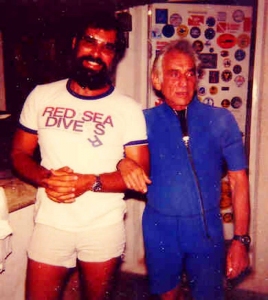
Another Side of Lenny
In the early 1970's I was living in Sharem el Sheikh, Sinai (then Israel, now returned back to Egypt) and operating there as the first Scuba Diving business. In those early years business was slow with the odd tourist showing up every once in a while for snorkeling or scuba diving in this coral paradise on the Red Sea.
By the mid 70’s business was picking up and after a day of diving I came back to the shop on the beach at Naama Bay and checked the daily rental forms that my Bedouin helper Mahmoud was organizing. On the topmost form was a name that I was well familiar with. Leonard Bernstein from New York had rented a mask, snorkel and pair of fins while I was out diving. Could this be the same Leonard Bernstein that I watched every week giving his famous Children’s concerts on TV when I was growing up in LA? I had to find out.
I quickly went to the hotel reception next door and queried the receptionist about the guest Leonard Bernstein, after her description matched the images I had in my mind, I took a chance and put a note in his key box inviting him to go out diving the next day with me as my guest.
Sure enough he showed up the next morning, an eager and even somewhat experienced diver (he said he had been diving before in the Caribbean). He happily joined us aboard our little skiff and had what he described as “the time of his life”. He seemed so very approachable and friendly. He just liked being in the cobalt blue water, snorkeling and diving or just hanging out with our crew and guests.
After this chance meeting in the mid 1970’s, every time he would visit Israel for a concert or another event he would always take a few days off and come and just hang around with us at Red Sea Divers, Sharem el Sheikh, to escape the crowds, his frenetic lifestyle and busy schedule. For just a few days, each time, he was Lenny, one of the gang and it was so much fun to have him around.
There are many anecdotes and stories I can share here but one experience stands out in my mind and I will remember it for as long as I live.
In 1981, Israel was preparing to leave the Sinai and return it to Egypt as part of the Camp David Accords worked out between President Carter, President Sadat and Prime Minister Begin. This was only a year before the final Israeli withdrawal and by chance Lenny was back with us in Sharem just after giving a concert in Tel Aviv. Coincidentally we had a team from National Geographic staying with us while covering the Sinai withdrawal (article appeared in the April 1982 edition of National Geographic).
All of a sudden the authorities advised us that all of our guests had to evacuate the area as Sadat and Begin decided to have a summit meeting in Sharem the next week. That would mean Lenny and the National Geographic team would have to leave which was really bad news for us, for obvious reasons. I made an appeal to the military adviser of Prime Minister Begin and surprisingly received special permission for both Lenny and National Geographic to stay on, the name Leonard Bernstein always carried a lot of weight in Israel!
During this week in preparations for the summit, our diving center became the hub for all the hundreds of journalists and electronic media people who came to cover the event. Every major American, European TV network had crews down in Sharem which was at that time a sleepy little town with 1 ½ hotels, 3 restaurants and little else.
Nothing much was happening (unless you were really into SCUBA), hearing that an American (me) was running the diving operations there, attracted ABC, NBC, CBS to come interview me in order to get some local “color”. When they saw Lenny sitting next to us having lunch in our little restaurant, they went ballistic. Obviously, he was a much better story then me!
In any respect, they asked me for ideas of stories they could pursue whilst waiting for Begin and Sadat to show up. I was obviously anxious to get their attention and perhaps some amazing publicity and income for our struggling business. I told them that just south of Sharem at a place called Ras Mohamed, (one of the worlds truly great and now famous diving sites), there were reports that at night for the first time ever, Israeli and Egyptian fisherman were anchoring side by side fishing at night. This was almost revolutionary for anyone privy to the historical antagonism if not outright hatred and violence between Israeli’s and Egyptians up to this peace process.
I had it on good authority from my fishermen friends that this was indeed a sight to behold and when I shared it with the ABC anchor who jumped on the idea and chartered our best dive boat to go out that night and film the event. Lenny, having been in earshot of all this immediately insisted that he come along as well. Lenny was not an easy person to say no to and the ABC crew just loved the idea. So a time was set, later that evening and the deal was struck. After hearing of our plans, the National Geographic team of David and Anne Doubilet also requested permission and they were on as well. For us, ABC News and National Geographic on our boat was the ultimate “wet dream”.
The only problem for me was to figure out how to sneak into an area that was absolutely off limits to tourist boats like mine. The fishermen had special permits that were not available to us. I made a plan to deceive the navy by heading north toward Tiran Island and then looping south east and then west to finally reach the fishing spot just to the west of Ras Mohamed. Things were a little tense on the boat as we couldn’t run any navigation lights and it was a dark night without a trace of the moon. Luckily our radar picked up the dots just off the coastline signaling the fishing boats were indeed in place. The camera crews got their gear ready, we didn’t have a clue what was about to transpire.
We steered the dive boat right at the largest cluster of fishing boats, moving in total darkness. Lenny was loving every minute of it. So alien to his normal world of glitz and glitter. About 50 yards from the fishing boats, I allowed the film team to put on their very powerful lights and together with our ships spotlight, we really lit up the entire sea exposing tens of small fishing boats and a few larger Egyptian boats down from Suez. This was the first time in 15 years (since the 1967, 6 day war) that they could access these bountiful waters.
We definitely freaked the fishermen out as they surely thought we were the Israeli Navy coming in on a raid. With cameras running we pulled right up to the stern of the largest Egyptian fishing boat. They had Arabic music blaring from a portable cassette tape, fish innards and bait strewn all over the place, on the deck, everywhere. Big men dressed in Jellabiya’s and without doubt carrying the scent of their work.
I had told everyone on our boat not to think about going onto the Egyptian boat until one of the Arabic speaking members of our crew could ask permission so you can imagine how surprised and definitely worried I became when I noticed Lenny jump from our bow onto the slippery back deck of the fishing boat and start mingling with the Egyptian fishermen. I quickly jumped over the railing to join him but before I could reach him he was engaged in a Debka dance with the biggest, swarthiest fisherman there. The scene was beyond surrealistic, the fisherman was nearly twice the size of Lenny and the two of them were like swirling Dervishes moving to the Arabic melodies. After 10 minutes of this, the fisherman, who obviously had no clue that his dance partner was probably the most famous musician and artist in the world, picked him up and gave him a kiss on the cheek!
At that point, our boat was tied off onto the fishing boat and the TV and Magazine crews were filming and clicking away.
This bizarre and amazing scene at Ras Mohamed, one of the most remote spots in the world, will stay with me and all those who witnessed it forever. Needless to say, Lenny had the time of his life and I can remember his beaming face on the long, dark ride back to port!
He was one of a kind for sure.
By the mid 70’s business was picking up and after a day of diving I came back to the shop on the beach at Naama Bay and checked the daily rental forms that my Bedouin helper Mahmoud was organizing. On the topmost form was a name that I was well familiar with. Leonard Bernstein from New York had rented a mask, snorkel and pair of fins while I was out diving. Could this be the same Leonard Bernstein that I watched every week giving his famous Children’s concerts on TV when I was growing up in LA? I had to find out.
I quickly went to the hotel reception next door and queried the receptionist about the guest Leonard Bernstein, after her description matched the images I had in my mind, I took a chance and put a note in his key box inviting him to go out diving the next day with me as my guest.
Sure enough he showed up the next morning, an eager and even somewhat experienced diver (he said he had been diving before in the Caribbean). He happily joined us aboard our little skiff and had what he described as “the time of his life”. He seemed so very approachable and friendly. He just liked being in the cobalt blue water, snorkeling and diving or just hanging out with our crew and guests.
After this chance meeting in the mid 1970’s, every time he would visit Israel for a concert or another event he would always take a few days off and come and just hang around with us at Red Sea Divers, Sharem el Sheikh, to escape the crowds, his frenetic lifestyle and busy schedule. For just a few days, each time, he was Lenny, one of the gang and it was so much fun to have him around.
There are many anecdotes and stories I can share here but one experience stands out in my mind and I will remember it for as long as I live.
In 1981, Israel was preparing to leave the Sinai and return it to Egypt as part of the Camp David Accords worked out between President Carter, President Sadat and Prime Minister Begin. This was only a year before the final Israeli withdrawal and by chance Lenny was back with us in Sharem just after giving a concert in Tel Aviv. Coincidentally we had a team from National Geographic staying with us while covering the Sinai withdrawal (article appeared in the April 1982 edition of National Geographic).
All of a sudden the authorities advised us that all of our guests had to evacuate the area as Sadat and Begin decided to have a summit meeting in Sharem the next week. That would mean Lenny and the National Geographic team would have to leave which was really bad news for us, for obvious reasons. I made an appeal to the military adviser of Prime Minister Begin and surprisingly received special permission for both Lenny and National Geographic to stay on, the name Leonard Bernstein always carried a lot of weight in Israel!
During this week in preparations for the summit, our diving center became the hub for all the hundreds of journalists and electronic media people who came to cover the event. Every major American, European TV network had crews down in Sharem which was at that time a sleepy little town with 1 ½ hotels, 3 restaurants and little else.
Nothing much was happening (unless you were really into SCUBA), hearing that an American (me) was running the diving operations there, attracted ABC, NBC, CBS to come interview me in order to get some local “color”. When they saw Lenny sitting next to us having lunch in our little restaurant, they went ballistic. Obviously, he was a much better story then me!
In any respect, they asked me for ideas of stories they could pursue whilst waiting for Begin and Sadat to show up. I was obviously anxious to get their attention and perhaps some amazing publicity and income for our struggling business. I told them that just south of Sharem at a place called Ras Mohamed, (one of the worlds truly great and now famous diving sites), there were reports that at night for the first time ever, Israeli and Egyptian fisherman were anchoring side by side fishing at night. This was almost revolutionary for anyone privy to the historical antagonism if not outright hatred and violence between Israeli’s and Egyptians up to this peace process.
I had it on good authority from my fishermen friends that this was indeed a sight to behold and when I shared it with the ABC anchor who jumped on the idea and chartered our best dive boat to go out that night and film the event. Lenny, having been in earshot of all this immediately insisted that he come along as well. Lenny was not an easy person to say no to and the ABC crew just loved the idea. So a time was set, later that evening and the deal was struck. After hearing of our plans, the National Geographic team of David and Anne Doubilet also requested permission and they were on as well. For us, ABC News and National Geographic on our boat was the ultimate “wet dream”.
The only problem for me was to figure out how to sneak into an area that was absolutely off limits to tourist boats like mine. The fishermen had special permits that were not available to us. I made a plan to deceive the navy by heading north toward Tiran Island and then looping south east and then west to finally reach the fishing spot just to the west of Ras Mohamed. Things were a little tense on the boat as we couldn’t run any navigation lights and it was a dark night without a trace of the moon. Luckily our radar picked up the dots just off the coastline signaling the fishing boats were indeed in place. The camera crews got their gear ready, we didn’t have a clue what was about to transpire.
We steered the dive boat right at the largest cluster of fishing boats, moving in total darkness. Lenny was loving every minute of it. So alien to his normal world of glitz and glitter. About 50 yards from the fishing boats, I allowed the film team to put on their very powerful lights and together with our ships spotlight, we really lit up the entire sea exposing tens of small fishing boats and a few larger Egyptian boats down from Suez. This was the first time in 15 years (since the 1967, 6 day war) that they could access these bountiful waters.
We definitely freaked the fishermen out as they surely thought we were the Israeli Navy coming in on a raid. With cameras running we pulled right up to the stern of the largest Egyptian fishing boat. They had Arabic music blaring from a portable cassette tape, fish innards and bait strewn all over the place, on the deck, everywhere. Big men dressed in Jellabiya’s and without doubt carrying the scent of their work.
I had told everyone on our boat not to think about going onto the Egyptian boat until one of the Arabic speaking members of our crew could ask permission so you can imagine how surprised and definitely worried I became when I noticed Lenny jump from our bow onto the slippery back deck of the fishing boat and start mingling with the Egyptian fishermen. I quickly jumped over the railing to join him but before I could reach him he was engaged in a Debka dance with the biggest, swarthiest fisherman there. The scene was beyond surrealistic, the fisherman was nearly twice the size of Lenny and the two of them were like swirling Dervishes moving to the Arabic melodies. After 10 minutes of this, the fisherman, who obviously had no clue that his dance partner was probably the most famous musician and artist in the world, picked him up and gave him a kiss on the cheek!
At that point, our boat was tied off onto the fishing boat and the TV and Magazine crews were filming and clicking away.
This bizarre and amazing scene at Ras Mohamed, one of the most remote spots in the world, will stay with me and all those who witnessed it forever. Needless to say, Lenny had the time of his life and I can remember his beaming face on the long, dark ride back to port!
He was one of a kind for sure.
Howard Rosenstein, Hofit, Israel
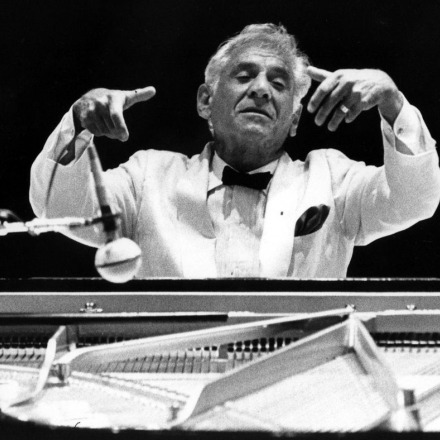
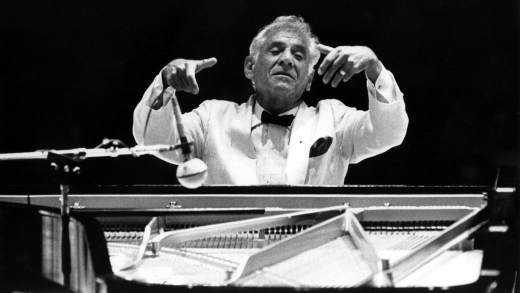
Appalachian Spring, Rhapsody in Blue
Leonard Bernstein conducted the American Youth Symphony at the Hollywood Bowl one summer in the 1980s. He conducted Appalachian Spring, but the highlight was when he conducted and played Rhapsody in Blue. He played the tastiest jazz licks in the "walking blues" section of the piece. I don't even think anyone rolled a wine bottle down the aisle. That memory is among my favorite musical memories.
[Photo: Leonard Bernstein conducts and plays Gershwin's "Rhapsody in Blue" with the Los Angeles Philharmonic at the Hollywood Bowl in 1982. (Los Angeles Times)]
[Photo: Leonard Bernstein conducts and plays Gershwin's "Rhapsody in Blue" with the Los Angeles Philharmonic at the Hollywood Bowl in 1982. (Los Angeles Times)]
John Chapman, Hollywood Bowl, CA, United States
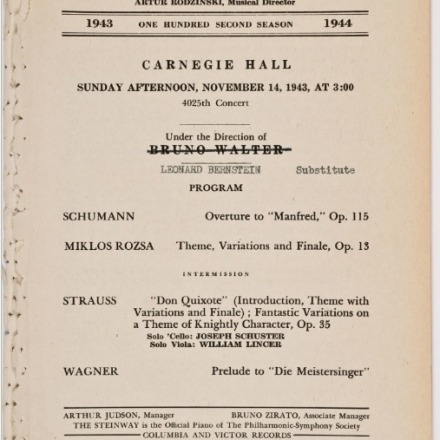
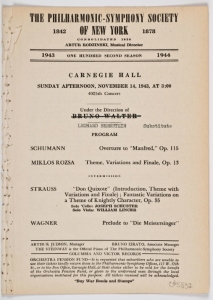
Bernstein's Debut
One Sunday in 1943 my father took me to a NY Philharmonic concert. An announcement was made that the conductor, Bruno Walter, was ill and the concert would be conducted by the Assistant Conductor, making his debut. It was, of course, Leonard Bernstein.
In the subway going home my father said to me "Remember this day always because you saw the debut of a genius."
Here it is, 75 years later, and I still remember his very words which were entirely true.
In the subway going home my father said to me "Remember this day always because you saw the debut of a genius."
Here it is, 75 years later, and I still remember his very words which were entirely true.
Judith Goldsmith, Lenox, MA
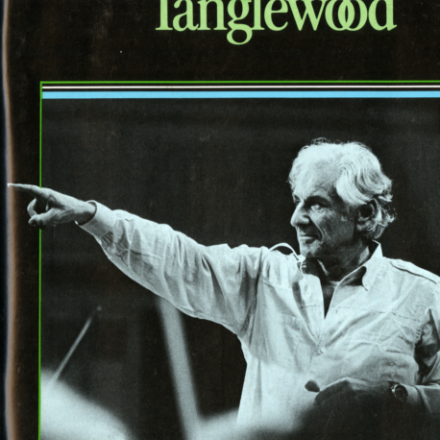
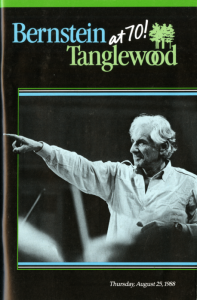
Leonard on his 70th Birthday!!!
It was very late at night, after a long session in my studio in Australia,that I decided to try and contact, my hero. I had been listening to some versions of "West Side Story". After a lot of convulated phone calls and messages, I was directed to the Tanglewood Music Campus in Lenox, by the Amberson Corporation. Without knowing it, this was Bernstein's 70th. Birthday! Waiting with anxiety about my cheeky call, a husky voiced male answered. It was Leonard Bernstein himself. I "was told this is my Birthday Party", and then we talked about Art and Music. "Wish you could be here". All this took several minutes, but this time was beyond measurement. A rich and rewarding experience. His voice and manner seemed ageless.His Biblical life span had come, and now his memory is eternal. Such a experience for me, that still colors my being.
Michael Morgan, Birches Bay, Tasmania, Australia
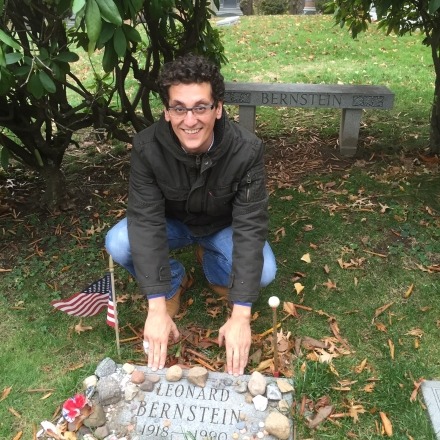
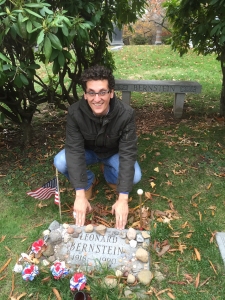
At Carnegie Hall
When I was playing a concert in Carnegie Hall I went to pay my respects to the Maestro.
Óscar Lobete, Spain
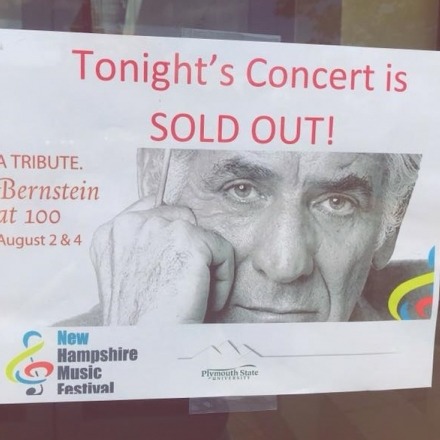
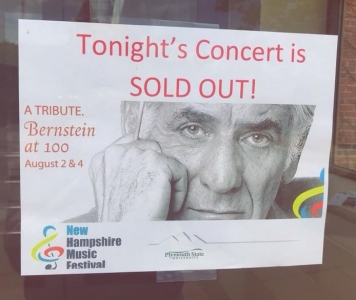
OMG! He is a human!
I was a little girl and I loved to watch Leonard Bernstein's television show. My favorite was Peter and the Wolf. I was absolutely mesmerized by how he moved and how connected he was to the music. I did not think he was human. I thought they wound him up so he could dance to the music. I was stunned when they panned out and he walked off the podium on legs! I truly thought he was the music and he could only move if there was music. Tonight (Aug. 2, 2018), I will be singing his Mass in the choir of the New Hampshire Music Festival (sold out). I promise to be the music not just sing the words.
Mandy Gennaro, NH, United States
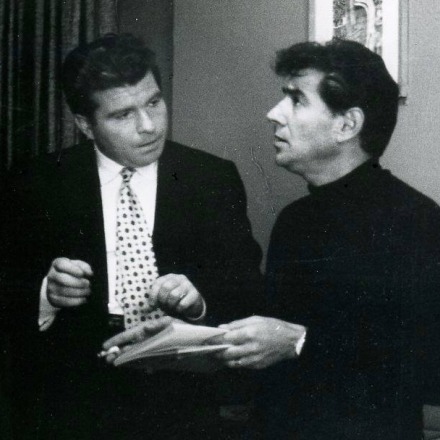
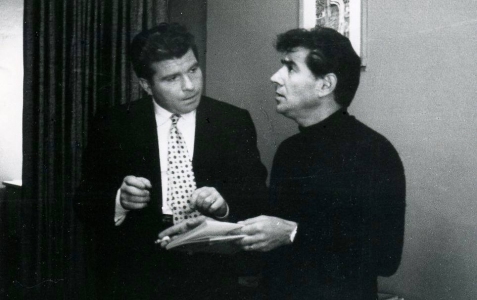
With my uncle Emil Gilels
My grandfather's brother was the Soviet classical pianist Emil Gilels. He first came to the US in 1955 and was the first Soviet artist to visit the US. He met with my idol Leonard Bernstein (photo attached), I wasn't there, either just born or not yet, but am pretty sure they discussed music, composers, etc. I cherish the photo!
Deborah Gilels, Los Angeles, CA, United States
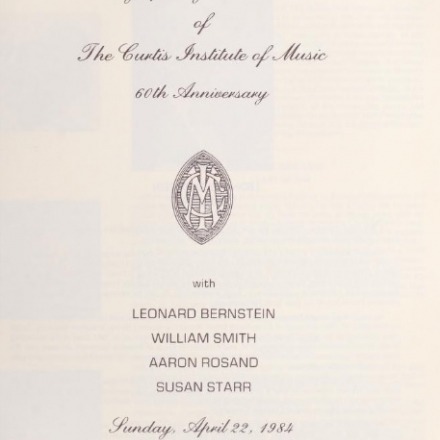
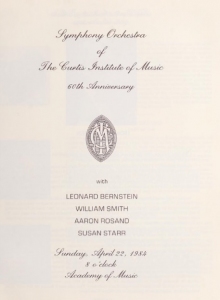
A conductor who made the earth move
I only heard Leonard Bernstein conduct once. It was at the 60th anniversary concert by the Curtis Institute Orchestra held at the Academy of Music in Philadelphia on Easter Sunday, April 22, 1984. The program included his Symphony #2 with Susan Starr as the piano soloist. At one point in the concert a tremble was felt in the hall--presumably a large truck going down Broad Street.
The next day I read in the paper that there had been an earthquake centered near Lancaster, PA, at about 10pm that was felt in 5 states.
Years later, reading Joan Peyser's biography, I learned that on two other occasions--once in South America and once in LA--his concerts were punctuated by earthquakes. It can't have been coincidence.
The next day I read in the paper that there had been an earthquake centered near Lancaster, PA, at about 10pm that was felt in 5 states.
Years later, reading Joan Peyser's biography, I learned that on two other occasions--once in South America and once in LA--his concerts were punctuated by earthquakes. It can't have been coincidence.
Christopher Freitag, New York, NY
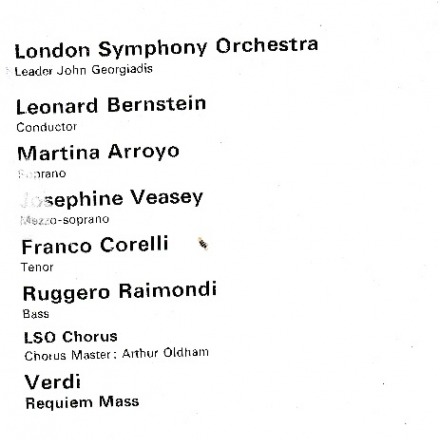
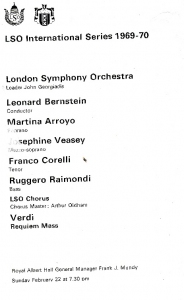
My first big concert - boy, how big!
For my first concert in London, aged 12, I chose to attend a performance of the Verdi Requiem by the London Symphony Orchestra and Bernstein. I selected seats behind the orchestra so I could watch the conductor (as an aspiring conductor myself!). We were directly above and behind the bass drum - although I knew the work a bit, I nearly took off at the Dies Irae! Somehow, my father managed to take me backstage afterwards where I met the soloists, who all autographed my programme. It's been sitting in a box for nearly 50 years! The performance was to have featured Franco Corelli but he was 'indisposed'.
When the work was filmed for TV in St. Paul's Cathedral a day or two afterwards, a young Placido Domingo made his mark, alongside the wonderful Martina Arroyo, Josephine Veasey and a very tall, young Ruggero Raimondi! It was the first of several occasions I met and was inspired by Lenny. I later attempted to negotiate the rights to stage the UK premiere of Mass before finding myself at the University that was actually performing it - I sang in the choir, also at the Royal Albert Hall and was delighted to find my parents had bought tickets (secretly) and attended the performance. My memories of that Verdi night and my first encounter with Lenny remain very vivid as I move house from London to the country on the path towards retirement.
When the work was filmed for TV in St. Paul's Cathedral a day or two afterwards, a young Placido Domingo made his mark, alongside the wonderful Martina Arroyo, Josephine Veasey and a very tall, young Ruggero Raimondi! It was the first of several occasions I met and was inspired by Lenny. I later attempted to negotiate the rights to stage the UK premiere of Mass before finding myself at the University that was actually performing it - I sang in the choir, also at the Royal Albert Hall and was delighted to find my parents had bought tickets (secretly) and attended the performance. My memories of that Verdi night and my first encounter with Lenny remain very vivid as I move house from London to the country on the path towards retirement.
Nicholas Goldwyn, Shropshire, United Kingdom
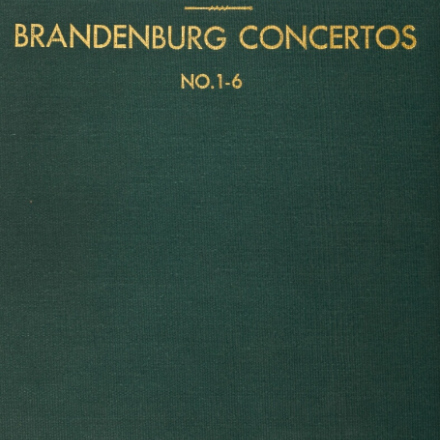
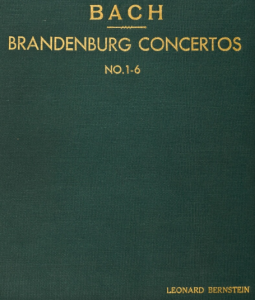
Hooked as a Forever Fan
My introduction to Leonard Bernstein came on that momentous day when he replaced Bruno Walter. I heard the broadcast and wrote to congratulate him. Helen Coates responded and I was hooked as a forever fan.
I saw him later at intermission at a Town Hall concert of a pianist friend. I was still in high school and had the nerve then to walk up and speak with him. I also attended his 6pm concerts at City Center during the war years and was so impressed when he played and conducted Bach's Brandenberg Concerto #5.
I admired the Broadway side of him when I attended Candide and West Side Story as well as joining the millions who learned from and enjoyed the TV programs. I saw him at Tanglewood when he was with Mrs. Joan Kennedy and so many fans surrounded him. I saw Jamie Bernstein running interference and remembered the thin, beautiful blouse she was wearing. I attended many concerts he conducted, the last when he programmed my favorite Mozart symphony. The numerous books by him and about him, along with the CDs that included the "On the Waterfront" music that I own will always serve to remind me of his extraordinary talent and genius.
I saw him later at intermission at a Town Hall concert of a pianist friend. I was still in high school and had the nerve then to walk up and speak with him. I also attended his 6pm concerts at City Center during the war years and was so impressed when he played and conducted Bach's Brandenberg Concerto #5.
I admired the Broadway side of him when I attended Candide and West Side Story as well as joining the millions who learned from and enjoyed the TV programs. I saw him at Tanglewood when he was with Mrs. Joan Kennedy and so many fans surrounded him. I saw Jamie Bernstein running interference and remembered the thin, beautiful blouse she was wearing. I attended many concerts he conducted, the last when he programmed my favorite Mozart symphony. The numerous books by him and about him, along with the CDs that included the "On the Waterfront" music that I own will always serve to remind me of his extraordinary talent and genius.
Gwen Toub
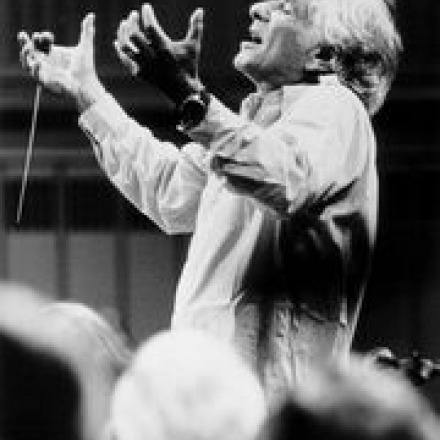
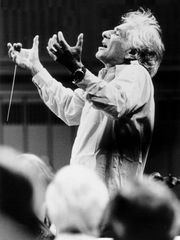
Concert on the athletic field with Leonard Bernstein conducting
Loved the concert. I believe it was towards the end of his career celebrating a birthday if I remember correctly in his home town. We were living in Andover at the time.
Mary Ellen O'Sullivan, Lawrence, MA, United States
Come On, Deliver...
the latest Leonard Bernstein news... to me!